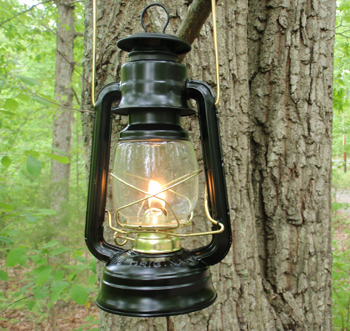We may earn revenue from the products available on this page and participate in affiliate programs. Learn More ›
When you’re prepping for disaster or stocking your backwoods camp, you always need to have sufficient lighting sources on your gear list. Light sticks, candles and flashlights are good, but what about something that is fuel efficient and works in all weather?
That’s where oil lamps come into play, my favorite being the lightweight Dietz Original lamp. This classic lamp works indoors and outdoors, through wind and rain. At 10½ inches tall and weighing 2¼ pounds empty, this little lamp’s 8-ounce fuel capacity provides an 11-hour burn time. The heat output is around 900 BTUs per hour, and it puts out an average of 7 candle power with a half inch of burning wick exposed.
These lamps cost about $11 each and operate on 2 or 3 cents per hour worth of lamp oil. When was the last time you received an hour’s worth of anything for 3 cents?
Approved Fuels For Oil Lamps
1. Non-dyed (clear) kerosene
2. Klean-Heat kerosene substitute
3. Standard clear lamp oil
4. Citronella oil (outdoor use only)
Keep in mind that paraffin oil (wax oil, Nowell’s, Ultra-Pure, Tropical Lights, etc.) may be marketed for oil lamps, but it may only burn half as bright of any of the approved fuels listed above. Paraffin oil is thick, and its flash point is 100 degrees higher than that of kerosene. This inhibits the capillary action of the wick, and will cause lanterns with a ⅞-inch or larger wick to burn improperly and erratic. Once a wick is contaminated with paraffin, it must be replaced in order to burn properly with a different fuel.
**
Friendly Tips:**
Even if you are burning “odorless” fuel, your lamp might stink until the paint fumes burn off your new lamp. Burn it outside for a few hours before you begin using the lamp indoors.
As with all flame-bearing light sources, exercise caution around kids, pets and any combustible items.
**
Full On Warnings:**
NEVER USE gasoline, Coleman fuel, white gas, paint thinner, wood alcohol, diesel, naphtha, turpentine, or any other explosive fuel in a wick lamp or lantern of any type.
NEVER USE aviation fuels in any wick lamp or lantern, as the fumes from de-icing additives can be fatal if inhaled.
